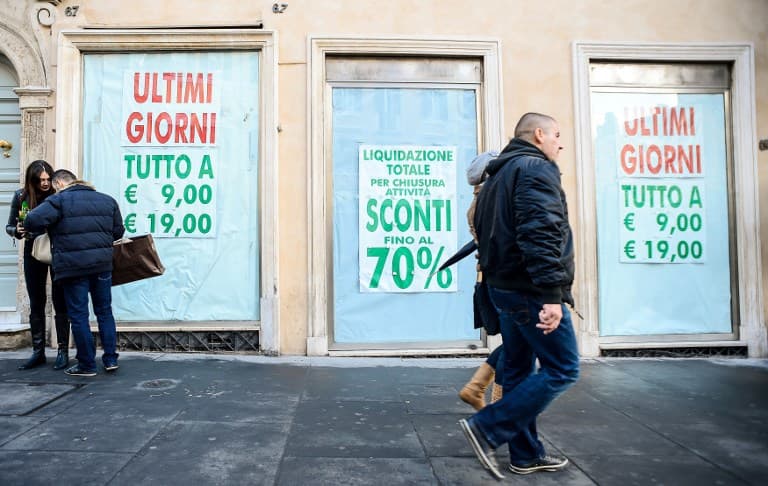Italian economy to grow less than government predicts, says stats agency

The Italian economy is forecast to grow 1.3 percent next year, the national statistics agency said on Wednesday, below the government's estimate of 1.5 percent included in a big-spending budget rejected by Brussels.
Istat said growth this year will come in at a slower 1.1 percent but added that unemployment could improve slightly in both years.
"These projections take into account the less favourable international framework and the expansionary fiscal policies" of the budget, Istat cautioned in a statement.
With the financial markets in turmoil, there has been increasing concern that the global economy is slowing.
Italy's populist government has argued that after years of failed austerity policies, it is time to stimulate the economy to offer Italians some respite and hope for the future.
READ ALSO: Here are the main things included in Italy's 'people's budget'

Italian Prime Minister Giuseppe Conte (C) with his deputies Luigi Di Maio (L) and Matteo Salvini (R). Photo: Filippo Monteforte/AFP
Rome has submitted to the European Union a 2019 budget based on a public deficit of 2.4 percent of gross domestic product in 2019 -- three times the target of the government's centre-left predecessor -- and one of 2.1 percent in 2020.
But Brussels says this will only increase Italy's overall debt, with the deficit hitting 2.9 percent of GDP in 2019 and 3.1 percent in 2020 -- breaching the EU's 3.0 percent limit.
The EU says the government must do the sums again, but Rome insists it will not change and that the EU should instead adopt its expansionary stance.
Italy could face EU sanctions and fines if it does not change course, with the European Commission due to release a report on the country's overall debt position later on Wednesday.
Italy's debt amounts to more than 130 percent of GDP, second only to Greece's in the bloc and way above the EU's limit of 60 percent.
READ ALSO:
-
Italy's budget battle with Brussels: What you need to know
-
Italy vows to keep the euro despite budget standoff
-
Italians rush to put money into Swiss banks as budget fears grow

Photo: Gerard Cerles/AFP
Comments
See Also
Istat said growth this year will come in at a slower 1.1 percent but added that unemployment could improve slightly in both years.
"These projections take into account the less favourable international framework and the expansionary fiscal policies" of the budget, Istat cautioned in a statement.
With the financial markets in turmoil, there has been increasing concern that the global economy is slowing.
Italy's populist government has argued that after years of failed austerity policies, it is time to stimulate the economy to offer Italians some respite and hope for the future.
READ ALSO: Here are the main things included in Italy's 'people's budget'

Italian Prime Minister Giuseppe Conte (C) with his deputies Luigi Di Maio (L) and Matteo Salvini (R). Photo: Filippo Monteforte/AFP
Rome has submitted to the European Union a 2019 budget based on a public deficit of 2.4 percent of gross domestic product in 2019 -- three times the target of the government's centre-left predecessor -- and one of 2.1 percent in 2020.
But Brussels says this will only increase Italy's overall debt, with the deficit hitting 2.9 percent of GDP in 2019 and 3.1 percent in 2020 -- breaching the EU's 3.0 percent limit.
The EU says the government must do the sums again, but Rome insists it will not change and that the EU should instead adopt its expansionary stance.
Italy could face EU sanctions and fines if it does not change course, with the European Commission due to release a report on the country's overall debt position later on Wednesday.
Italy's debt amounts to more than 130 percent of GDP, second only to Greece's in the bloc and way above the EU's limit of 60 percent.
READ ALSO:
- Italy's budget battle with Brussels: What you need to know
- Italy vows to keep the euro despite budget standoff
- Italians rush to put money into Swiss banks as budget fears grow

Photo: Gerard Cerles/AFP
Join the conversation in our comments section below. Share your own views and experience and if you have a question or suggestion for our journalists then email us at [email protected].
Please keep comments civil, constructive and on topic – and make sure to read our terms of use before getting involved.
Please log in here to leave a comment.